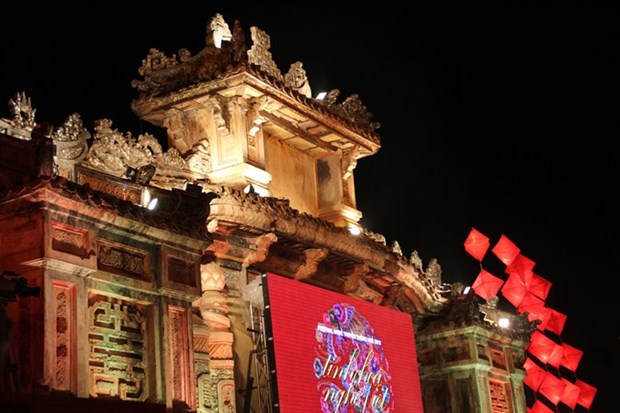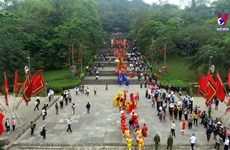Landmark restoration provokes fury in Hue
Anger broke out on social networks when it was discovered that an iconic building in the former imperial capital city of Hue had been changed completely while being restored.
 Old glory: A closer look of the pavilion’s rooftop before restoration work (Photo:VNA)
Old glory: A closer look of the pavilion’s rooftop before restoration work (Photo:VNA)Thua Thien-Hue (VNA) - Anger broke out on social networks when it was discovered that an
iconic building in the former imperial capital city of Hue had been changed
completely while being restored.
Following online opposition to the change, experts have expressed concerns over the authenticity of the building after its restoration.
On January 9, Phan Duy Dang, a resident of Hue, posted a picture of Quoc Hoc Pavilion in its final stages of restoration on his Facebook account, in which the pavilion has been painted bright yellow, different from its original earth yellow colour.
Dang’s photo spread across the network and many around the country shared the photo to express their concern over the lack of authenticity of a Hue landmark and their anger over careless restoration work.
“I must speak up over this. The heritage items are common legacy and we shouldn’t allow anyone to destroy them,” said Dang.
Dr Tran Dinh Hang, director of the Vietnam National Institute of Culture and Art Studies in Hue said the impact of careless restoration was not just the change in colour, but the architectural patterns on the pavilion.
“They cleaned the original patterns off the building and this is unacceptable. No restoration method uses hammers and metal chisels on complicated concrete patterns, which happened here,” he said.
Dr Tran Duc Anh Son, a researcher working in Da Nang’s Institute for Socio-economic Development, said on his Facebook page that restoration work on a heritage item differed from house repairing, in which authenticity of the item should be the top priority.
The constructors said the colour would fade after sunny days and had no worries over the authenticity. They also explained that no one knows the exact original colour of the building because only black and white photos of it could be found.
But Hang refuted this, saying he owns a collection of colourful photos of the building in earth yellow. He said experts and the public should be consulted over restoration work.
Nguyen Can, director of the Hue Controlling Centre for Parks and Urban Flora System and head of the pavilion’s restoration project, told local media that consultation work had been done with the local department of culture and sports and the Hue Monument Conservation Centre, a body which has been blamed for changing many old buildings in Hue.
The Vietnam National Institute of Culture and Art Studies in Hue requested authorities of Hue city to answer to researchers and the public over the case.
The pavilion was built in 1920 on the southern bank of the Huong River and opposite to the old Quoc Hoc High School’s memorial of Vietnamese and French soldiers who died in World War II.-VNA
Following online opposition to the change, experts have expressed concerns over the authenticity of the building after its restoration.
On January 9, Phan Duy Dang, a resident of Hue, posted a picture of Quoc Hoc Pavilion in its final stages of restoration on his Facebook account, in which the pavilion has been painted bright yellow, different from its original earth yellow colour.
Dang’s photo spread across the network and many around the country shared the photo to express their concern over the lack of authenticity of a Hue landmark and their anger over careless restoration work.
“I must speak up over this. The heritage items are common legacy and we shouldn’t allow anyone to destroy them,” said Dang.
Dr Tran Dinh Hang, director of the Vietnam National Institute of Culture and Art Studies in Hue said the impact of careless restoration was not just the change in colour, but the architectural patterns on the pavilion.
“They cleaned the original patterns off the building and this is unacceptable. No restoration method uses hammers and metal chisels on complicated concrete patterns, which happened here,” he said.
Dr Tran Duc Anh Son, a researcher working in Da Nang’s Institute for Socio-economic Development, said on his Facebook page that restoration work on a heritage item differed from house repairing, in which authenticity of the item should be the top priority.
The constructors said the colour would fade after sunny days and had no worries over the authenticity. They also explained that no one knows the exact original colour of the building because only black and white photos of it could be found.
But Hang refuted this, saying he owns a collection of colourful photos of the building in earth yellow. He said experts and the public should be consulted over restoration work.
Nguyen Can, director of the Hue Controlling Centre for Parks and Urban Flora System and head of the pavilion’s restoration project, told local media that consultation work had been done with the local department of culture and sports and the Hue Monument Conservation Centre, a body which has been blamed for changing many old buildings in Hue.
The Vietnam National Institute of Culture and Art Studies in Hue requested authorities of Hue city to answer to researchers and the public over the case.
The pavilion was built in 1920 on the southern bank of the Huong River and opposite to the old Quoc Hoc High School’s memorial of Vietnamese and French soldiers who died in World War II.-VNA













